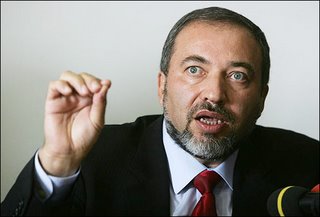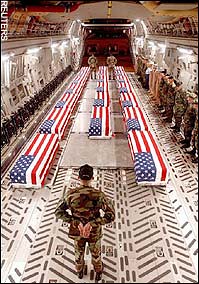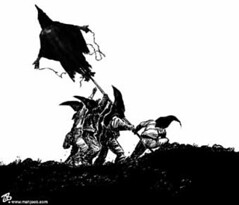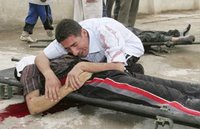DemocracyNow!
With Amy Goodman"A leading Israeli human rights organization accused Israel on Thursday of breaking international humanitarian law by holding thousands of Palestinian prisoners in Israel.
According to B'Tselem, international law prohibits the transfer of civilians, including prisoners, from the occupied territories to Israel.
On Thursday B'Tselem issued a 53-page report outlining how Israel's prison policies has made it nearly impossible for Palestinians to regularly visit relatives in jail.
Meanwhile, a former Israeli soldier named Yehuda Shaul has just begun a tour of the United States to give an inside look at how the Israeli military treats Palestinians in the West Bank and Gaza.
Shaul is a co-founder of Breaking the Silence - a group of former Israeli soldiers committed to exposing human rights abuses by the Israeli military.
Last year the group revealed that Israel soldiers had been ordered to open fire on unarmed Palestinians. The group has also gathered photographic evidence that proved Israeli soldiers have abused Palestinian corpses.
AMY GOODMAN: Could you talk to us a little bit about what you're hoping to accomplish on your tour?
YEHUDA SHAUL: I’m here in the United States, because, I would say, we in Breaking the Silence see the act of breaking the silence as an act of taking responsibility. As ex-Israeli soldiers, who’ve served as combat soldiers in the Occupied Territories and were there and committed all what we’re talking about, we're part of the occupation. After we were discharged and realized what we were doing and what was going on around us, there was only two options, as I see it. There’s or to lock ourselves in the room, cry and ask forgiveness, or to stand up and take responsibility and demand from others to take responsibility.
So, in my eyes, breaking the silence, standing up and telling the stories and trying to bring people to know and to realize and to understand what it means, occupation, on a daily basis, through these testimonies that we publish and the pictures that we had in the exhibition, is demanding from Israeli society to take responsibility for it, for what is being done in their behalf.
And in my eyes, in our eyes, responsibility doesn't end with ex-soldiers who served there or with Israelis, or the idea if our army as Israelis is doing all these things. Responsibility is to every human being in the world, and for sure for Americans, because in the end of the day for all what Israel does, there is only one country in the world that, you know, the chief of staff and the prime minister of Israel has to report in the end of the day, and that's the United States of America. For that reason, I think that people of America must know what's going on there and must break their own silence and take civil responsibility, human responsibility, to what is being done there.
JUAN GONZALEZ: I’d like to ask you about all of these thousands of Palestinian prisoners. From your perspective, as someone who's obviously had to participate in the capturing and imprisonment of some of these Palestinian civilians, what is this doing to Palestinian society, to have so many people locked up for such a long period of time under Israeli control?
YEHUDA SHAUL: I have no idea. I’m not a Palestinian. Just, you know, looking from the outside, seems like breaking all the family structure. I don't know, just trying to think of, you know, all the people that we arrested, bumping in the middle of the night through the windows, through the doors, through the roofs, waking up the family, taking people. No one knows when they're going to get back, why they were taken. You know, this is -- just, you know, almost every night in the Occupied Territories, you do an arrest operation. Every night you come back with what we saw in the pictures before, or you see now, of handcuffed, blindfolded Palestinians, who are just, you know, were now arrested, waiting to be taken to interrogations at the secret services.
But also, there's another kind of Palestinians, as you see now in the picture, and that's kind of what we call in Hebrew, or I will translate it, what we called “dry outs,” or if I would professionally translate it, “detainees.” And these are Palestinians, you know, when you stand in the checkpoint and you ask from all the Palestinians to stand in a very nice one line, and suddenly one of them starts screaming or leaves the line, so you must educate him, right? They must know who’s the boss. So you detain the man aside. You took him, handcuff, blindfold -- five, six, seven hours, it could be more, it could be less. Or you call a Palestinian in the checkpoint, you ask from him his ID. He smiles too much. You must educate them.
And all the system is built on fear. It's built of just oppressing, I don't know, of not being able to treat Palestinians as equal human beings to you, because the job is to do things that you don't do to equal human beings, you know, to bump in the middle of the night to a family from the roof and wake up all the family, separate men from women and just search all the house. It's something that you don't do to an equal human being to you. It's something that I never done in Israel, but in the Occupied Territories, as a combat soldier, as an occupier, that's my daily job, 24/7, house after house."
Read The Rest of The Transcript of Today's Interview



























